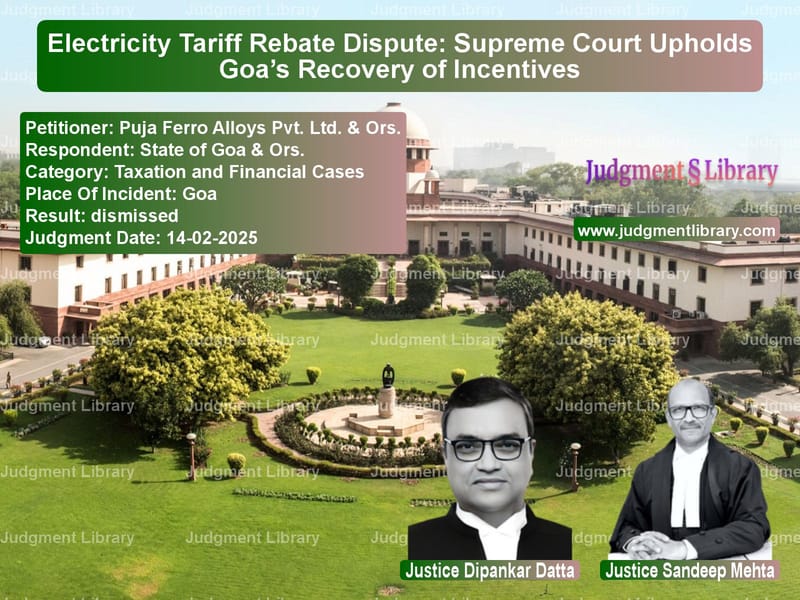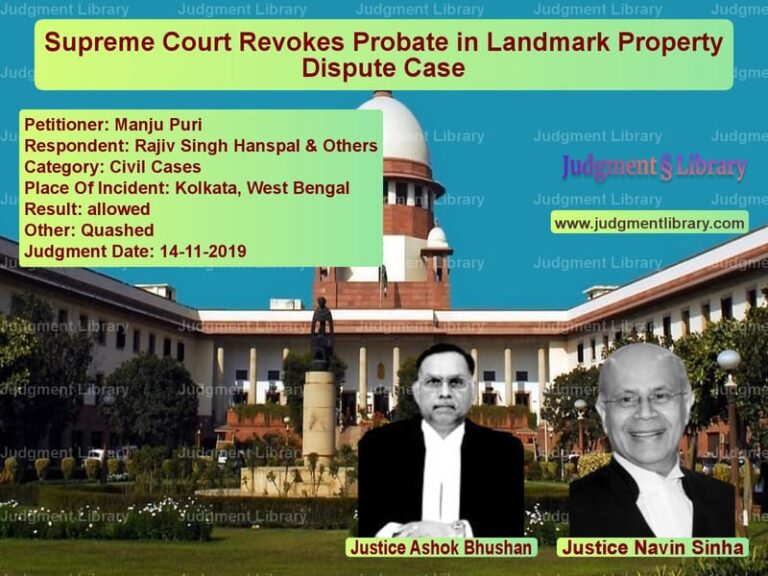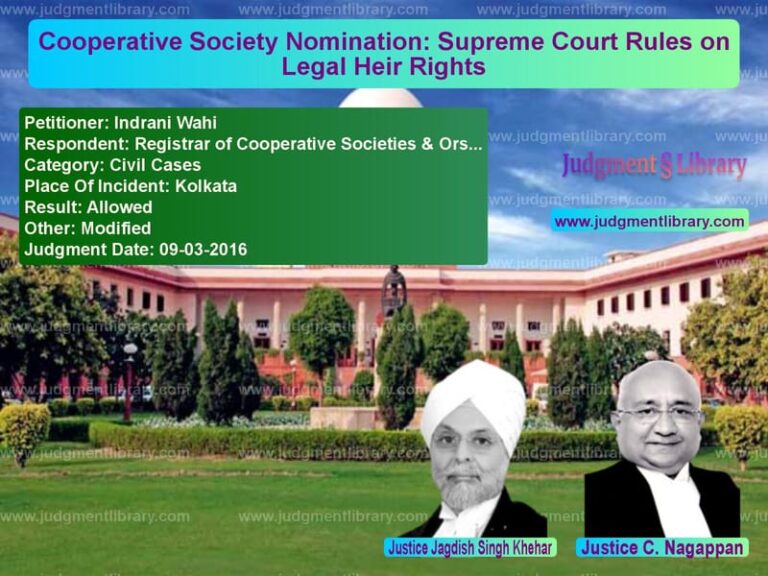Electricity Tariff Rebate Dispute: Supreme Court Upholds Goa’s Recovery of Incentives
The case of Puja Ferro Alloys Pvt. Ltd. & Ors. vs. State of Goa & Ors. is a significant legal battle concerning the withdrawal of electricity tariff rebates provided by the Government of Goa (GoG) to industrial units. The Supreme Court was tasked with deciding whether the withdrawal of these rebates and subsequent demand for recovery were legally valid. This judgment clarifies key issues regarding promissory estoppel, retrospective policy changes, and financial incentives for industries.
Background of the Case
The dispute arose from the Government of Goa’s 1991 policy offering a 25% rebate on electricity tariffs to new industrial units. However, the policy was rescinded in 1995, affecting several industries that had already set up operations. Despite this, the rebate scheme was later amended and extended in 1996, leading to confusion over its applicability.
Several companies, including Puja Ferro Alloys Pvt. Ltd., Karthik Alloys Ltd., Karthik Inductions Ltd., Global Ispat Ltd., and Sunrise Electromelt Ltd., filed petitions claiming entitlement to the rebate. The Goa government, however, argued that these companies had availed the benefits illegally and issued demand notices seeking repayment.
Read also: https://judgmentlibrary.com/supreme-court-overrules-excise-duty-demand-against-bharat-petroleum/
Chronology of Key Events
- 1988: Goa government sets electricity tariff rules.
- 1991: A new notification grants a 25% rebate to industrial units for five years.
- 1995: The 1991 notification is rescinded, stopping new applications.
- 1996: The scheme is amended and extended to Extra High-Tension users.
- 1998: The government suspends the rebate.
- 2002: The Goa government enacts the Goa (Prohibition of Further Payments and Recovery of Rebate Benefits) Act, 2002, mandating the recovery of rebates given under the 1996 amendments.
- 2011: The Goa High Court upholds the government’s decision to withdraw the rebate and initiate recovery.
- 2025: The Supreme Court upholds the Goa High Court’s decision.
Petitioners’ Arguments
The companies challenging the government’s decision argued that:
- They had invested heavily in Goa based on the government’s promise of a tariff rebate.
- The 1991 notification was in force when they applied for power, entitling them to the rebate.
- Even though the 1995 notification rescinded the scheme, the 1996 amendments revived it, making them eligible.
- The Goa government’s demand for repayment was unfair, arbitrary, and contrary to the doctrine of promissory estoppel.
Respondent’s Arguments
The Government of Goa contended that:
- The 1991 notification was rescinded in 1995, before the petitioners started consuming power, making them ineligible.
- The 1996 amendments were later declared invalid and void ab initio, meaning no valid rebate scheme existed.
- The Goa (Prohibition of Further Payments and Recovery of Rebate Benefits) Act, 2002, allowed for the recovery of previously granted rebates.
- Past court decisions had already upheld the government’s stance, and the principle of res judicata applied.
Supreme Court’s Observations
The Supreme Court upheld the High Court’s ruling, stating:
- The 1991 rebate scheme was legally rescinded in 1995, so the companies could not claim benefits.
- The 1996 amendments were later struck down, making any rebate granted under them legally unenforceable.
- Res judicata applies: Past court rulings had settled the issue, barring fresh litigation.
- The government had a right to withdraw incentives when overriding public interest, such as a financial crisis, justified it.
Final Judgment
The Supreme Court:
- Dismissed all appeals, upholding the government’s right to recover rebates.
- Ruled that all rebates granted under the 1996 amendments must be refunded.
- Reaffirmed that the principle of promissory estoppel does not apply when policy changes are justified by public interest.
The Supreme Court concluded:
“Public interest is what turns the tide against the appellant-companies. The Government of Goa had a justifiable ground of supervening public interest to withdraw the grant of rebate.”
Conclusion
This ruling sets a precedent for how government incentives can be lawfully revoked when public interest demands it. The case underscores the importance of businesses evaluating policy stability before making investment decisions. The decision reaffirms that while the government must honor commitments, it retains the right to modify or withdraw incentives if justified.
Petitioner Name: Puja Ferro Alloys Pvt. Ltd. & Ors..Respondent Name: State of Goa & Ors..Judgment By: Justice Dipankar Datta, Justice Sandeep Mehta.Place Of Incident: Goa.Judgment Date: 14-02-2025.
Don’t miss out on the full details! Download the complete judgment in PDF format below and gain valuable insights instantly!
Download Judgment: puja-ferro-alloys-pv-vs-state-of-goa-&-ors.-supreme-court-of-india-judgment-dated-14-02-2025.pdf
Directly Download Judgment: Directly download this Judgment
See all petitions in Tax Refund Disputes
See all petitions in Banking Regulations
See all petitions in Judgment by Dipankar Datta
See all petitions in Judgment by Sandeep Mehta
See all petitions in dismissed
See all petitions in supreme court of India judgments February 2025
See all petitions in 2025 judgments
See all posts in Taxation and Financial Cases Category
See all allowed petitions in Taxation and Financial Cases Category
See all Dismissed petitions in Taxation and Financial Cases Category
See all partially allowed petitions in Taxation and Financial Cases Category







